初中阶段加前后缀构成反义词归纳(供参考)
初中阶段常见的前后缀总结
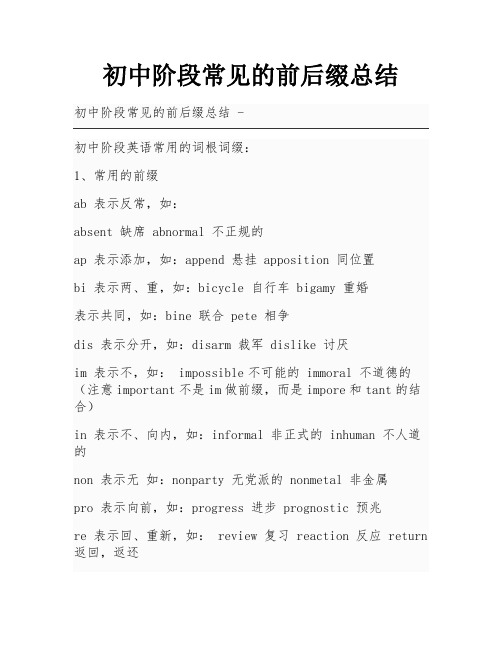
初中阶段常见的前后缀总结初中阶段英语常用的词根词缀:1、常用的前缀ab 表示反常,如:absent 缺席 abnormal 不正规的ap 表示添加,如:append 悬挂 apposition 同位置bi 表示两、重,如:bicycle 自行车 bigamy 重婚表示共同,如:bine 联合 pete 相争dis 表示分开,如:disarm 裁军 dislike 讨厌im 表示不,如: impossible不可能的 immoral 不道德的(注意important不是im做前缀,而是impore和tant的结合)in 表示不、向内,如:informal 非正式的 inhuman 不人道的non 表示无如:nonparty 无党派的 nonmetal 非金属pro 表示向前,如:progress 进步 prognostic 预兆re 表示回、重新,如: review 复习 reaction 反应 return 返回,返还un 表示不、非,如:unhappy 不快乐的 unbalance 失去平衡unlike不像(注意区别dislike“不喜欢”的意思)2、常用的后缀al 表示人、物,如:rival 竞争者 mural 壁画cy 表示状态、职位,如:bankruptcy 破产 captaincy 船长er 表示人、物,如:teacher 老师 singer歌手 writer作家waiter服务员 worker打工人 cooker 厨具(注意er还是大部分形容词的比较级后缀)able 表示可以的,是形容词的后缀。
如: movable 可移动的passable 可通行的 possible可能的fortable,changeable,reliable,suitable,acceptableful 表示充满,是形容词的后缀。
如: beautiful 美丽的useful 有用的 wonderful美妙的 awful糟糕的grateful感激的 hopeful抱有希望的 helpful有帮助的careful小心的(这些词后面加ly变成对应的副词)ous名词或名词词根与-ous后缀结合转化为形容词,是形容词的后缀。
[精]初中一二三年级英语词缀全整理
![[精]初中一二三年级英语词缀全整理](https://img.taocdn.com/s3/m/cfedf69e6c175f0e7cd137ea.png)
初中3年英语词缀全整理常用的前缀主要有:ab 表示反常如:absent 缺席abnormal 不正规的ap 表示添加如:append 悬挂apposition 同位置bi 表示两、重如:bicycle 自行车bigamy 重婚com 表示共同如:combine 联合compete 相争dis 表示分开如:disarm 裁军dislike 讨厌im 表示不如:impossible不可能的immoral 不道德的in 表示不、向内如:informal 非正式的inhuman 不人道的non 表示无如:nonparty 无党派的nonmetal 非金属pro 表示向前如:progress 进步prognostic 预兆re 表示回、重新如:review 复习reaction 反应un 表示不、非如:unhappy 不快乐的unbalance 失去平衡常用的后缀主要有:al 表示人、物如:rival 竞争者mural 壁画cy 表示状态、职位如:bankruptcy 破产captaincy 船长er 表示人、物如:teacher 老师cooker 厨具able 表示可能的如:movable 可移动的passable 可通行的ful 表示充满如:beautiful 美丽的useful 有用的or 表示人、物如:actor 男演员mirror 镜子ist 表示人如:copyist 抄写员socialist 社会主义者ment 表示行为如:enjoyment 娱乐movement 运动ing 表示令人如:exciting 令人兴奋的interesting 令人有兴趣的ed 表示感到如:excited 感到兴奋的interested 感到有兴趣的less 表示没有的如:resistless 不抵抗的homeless 无家可归的ly 副词后缀如:gently 轻轻地intently 专心地tion 名词后缀如:graduation 毕业relation 亲属典型的前后缀应用举例:1 excite vt.刺激exciting adj. 令人兴奋的excited adj.感到兴奋的excitement n.兴奋2 smile v./n.微笑smiling adj. 微笑的smilingly adv.微笑的unsmiling adj.不笑的自学小贴士:词根词缀记忆法常常被英语初学者所忽略,如果将此法配合多遍反复记法在自学中应用则可以做到举一至少反三的妙用。
最新反义词前后缀(部分整理
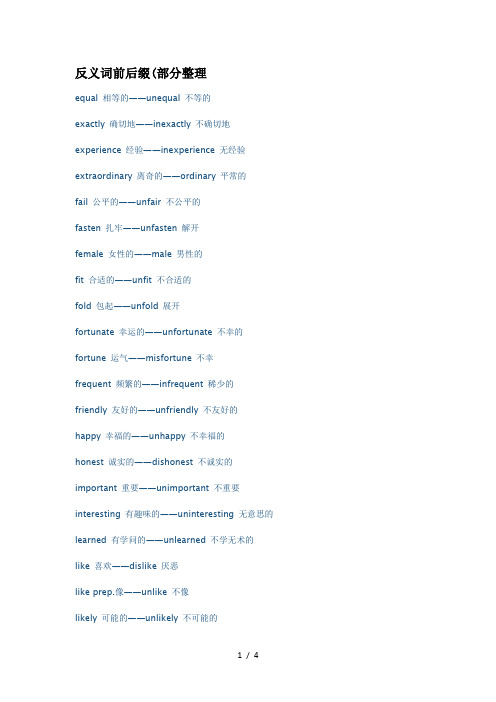
反义词前后缀(部分整理equal 相等的——unequal 不等的exactly 确切地——inexactly 不确切地experience 经验——inexperience 无经验extraordinary 离奇的——ordinary 平常的fail 公平的——unfair 不公平的fasten 扎牢——unfasten 解开female 女性的——male 男性的fit 合适的——unfit 不合适的fold 包起——unfold 展开fortunate 幸运的——unfortunate 不幸的fortune 运气——misfortune 不幸frequent 频繁的——infrequent 稀少的friendly 友好的——unfriendly 不友好的happy 幸福的——unhappy 不幸福的honest 诚实的——dishonest 不诚实的important 重要——unimportant 不重要interesting 有趣味的——uninteresting 无意思的learned 有学问的——unlearned 不学无术的like 喜欢——dislike 厌恶like prep.像——unlike 不像likely 可能的——unlikely 不可能的limited 有限的——unlimited 无限的lock n.锁上——unlock 开锁lucky 幸运的——unlucky 不幸运的misunderstanding 误会——understanding 理解mobile 可动的——immobile 不能动的national 国家的——international 国际的natural 自然的——unnatural 不自然的necessary 必需——unnecessary 不必要的non——smoker 不抽烟的人——smoker 抽烟的人non——violent 非暴力的——violent 暴力的obey 服从——disobey 不服从order 秩序——disorder 混乱ordinary 平常的——extraordinary 离奇的pack 打包——unpack 解开包裹patience 忍耐——impatience 不耐烦peaceful 和平的——unpeaceful 不和平的perfect 完美——imperfect 不完美的pleasant 令人愉快的——unpleasant 使不愉快的please 使人高兴——displease 使人不快pleasure 愉快——displeasurepolite 有礼的——implite 无礼的popular 受欢迎的unpopular 不受欢迎的possibility 可能性——impossibility 没有可能性的possible 可能的——impossible 不可能的probable 可能的——improbable 不可能的proper 适合的——improper 不适合的ready 准备好的——unready 未准备好的real 真的——unreal 不真实的ripe 熟的——unripe 未成熟的safely 安全地——unsafely 危险地satisfy 使满足——dissatisfy 使不满足的skilled 熟练的——unskilled 不熟练的steady 稳固的——unsteady 不平稳的successful 成功的——unsuccessful 不成功的suitable 合适的——unsuitable 不合适的tidy 整洁的——untidy 不整洁的tie 扎起来——untie 解开trust 信任——distrust 不信任truth 真实——untruth 不真实unsafe 不安全的——safe 安全的unsuccessful 不成功的——successful 成功的untrue 不真实的——true 真实的unusual 不平常的——usual 平常的useful 有用的——useless 无用的。
反义词前缀规律
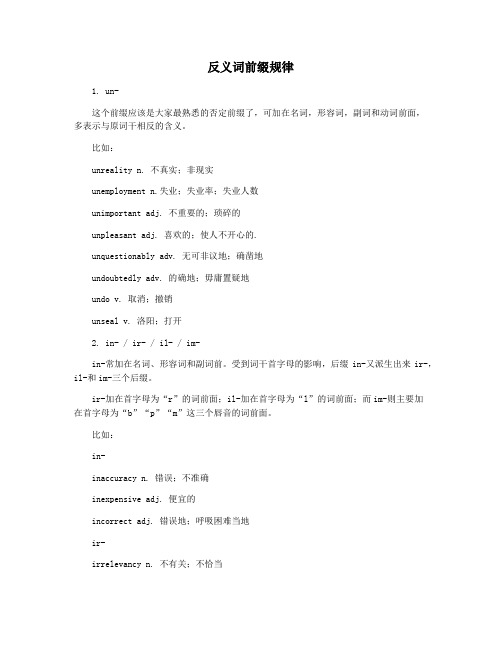
反义词前缀规律1. un-这个前缀应该是大家最熟悉的否定前缀了,可加在名词,形容词,副词和动词前面,多表示与原词干相反的含义。
比如:unreality n. 不真实;非现实unemployment n.失业;失业率;失业人数unimportant adj. 不重要的;琐碎的unpleasant adj. 喜欢的;使人不开心的.unquestionably adv. 无可非议地;确凿地undoubtedly adv. 的确地;毋庸置疑地undo v. 取消;撤销unseal v. 洛阳;打开2. in- / ir- / il- / im-in-常加在名词、形容词和副词前。
受到词干首字母的影响,后缀in-又派生出来ir-,il-和im-三个后缀。
ir-加在首字母为“r”的词前面;il-加在首字母为“l”的词前面;而im-则主要加在首字母为“b”“p”“m”这三个唇音的词前面。
比如:in-inaccuracy n. 错误;不准确inexpensive adj. 便宜的incorrect adj. 错误地;呼吸困难当地ir-irrelevancy n. 不有关;不恰当irrelevant adj. 不相干的;不切题的irresistibly adv. 无法抵抗地il-illegitimacy n. 不合逻辑illogical adj. 不合逻辑的;不合常理的illegally adv. 非法地im-imbalance n. 不均衡;不安稳impossible adj. 不可能的immemorially adv. 无法追忆地3. dis-dis-多加到形容词、动词和名词前。
例如:disagreeable adj. 不开心的dishonest adj. 不诚实的disappear v. 消失;并使...不存有dislike v. 不喜欢,厌恶 n. 不喜爱disapproval n. 不赞同;不讨厌disorder n. 混乱;骚乱v. 使失调;扰乱4. non-non-常加在形容词或名词前,一般需要保留连字符“-”。
初中英语前、后缀构词法归纳总结
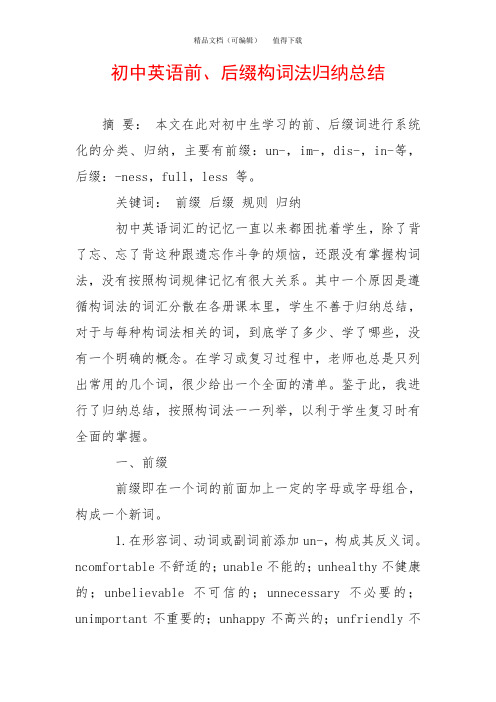
初中英语前、后缀构词法归纳总结摘要:本文在此对初中生学习的前、后缀词进行系统化的分类、归纳,主要有前缀:un-,im-,dis-,in-等,后缀:-ness,full,less 等。
关键词:前缀后缀规则归纳初中英语词汇的记忆一直以来都困扰着学生,除了背了忘、忘了背这种跟遗忘作斗争的烦恼,还跟没有掌握构词法,没有按照构词规律记忆有很大关系。
其中一个原因是遵循构词法的词汇分散在各册课本里,学生不善于归纳总结,对于与每种构词法相关的词,到底学了多少、学了哪些,没有一个明确的概念。
在学习或复习过程中,老师也总是只列出常用的几个词,很少给出一个全面的清单。
鉴于此,我进行了归纳总结,按照构词法一一列举,以利于学生复习时有全面的掌握。
一、前缀前缀即在一个词的前面加上一定的字母或字母组合,构成一个新词。
1.在形容词、动词或副词前添加un-,构成其反义词。
ncomfortable不舒适的;unable不能的;unhealthy不健康的;unbelievable不可信的;unnecessary不必要的;unimportant不重要的;unhappy不高兴的;unfriendly不友好的;uncommon不常见的;unfair不公平的;unusual不寻常的;unlucky不幸运的;unlike不像的;uninterested 不感兴趣的;unknown不知名的;unhelpful不愿意帮助的;untidy不整洁的;unfortunately不幸地;uninteresting 没意思的;unexpected出乎意料的;unforgettable难忘的。
2.在形容词、动词或名词前添加dis-,构成其反义词。
disagree不同意;discover发现;dislike不喜欢;disadvantage缺点;disappear消失;disabled残疾的;disbelief怀疑。
3.在形容词前添加in-,构成其反义词。
invisible 看不见的;incorrect不正的;informal非正式的。
初中英语反义词大全

初中英语反义词初中英语反义词大全1.all 都 - none 都不2.able 能 - unable 不能3.ask 问 - answer 答4.answer(n.) 答案 - question 问题5.after 在...之后 - before 在 ... 之前6.above 在 ... 上 - below 在 ...下7.alive 活着的 - dead 死的8.at the front of在 ... 前面 - at the back of 在 ... 后面9.at the beginning of 在开头 - at the end of 在末尾10.at night 在夜里 - in the day 在白天11.a little 一点 - much 很多12. a few 一点,几个 - many 很多13.at first 起初,开始 - at last 最后14. at least 至少 - at most 顶多15.bring 带来 - take 拿走16.better 更好 - worse 更糟17. best 最好 - worst 最差18. both 两者都 - neither 两者都不19.borrow 借(入) - lend 借(出)20.buy 买 - sell 卖21.brave 勇敢 - be afraid 害怕22.because 因为- therefore / so 所以23.busy 忙 - free 得闲24.beautiful 美丽 - ugly 丑陋25.be good at 擅长 - be weak in ...弱. 差26.both ... and ...和...都 - neither ... nor 既不...也不27begin / start 开始 - finish / end 结束28.behind 在...后 - in front of 在 ... 前29.before long 不久以后 - long before 很久以前30.black 黑 - white 白31.cheap 便宜 - expensive / dear 昂贵32.cold 寒冷 - hot 炎热33.cool 凉爽 - warm 温暖e 来 - go 去35.close 关闭 - open (v.) 打开36.closed 关闭的 - open (adj.) 开着的fortable 舒适的 - uncomfortable 不舒服的38.cry 哭 - laugh 笑39.crowded 拥挤的 - uncrowded 不拥挤的,宽敞的40.cover 覆盖- discover / reveal 发现,揭露41.catch up with 跟上 - fall behind 落后42.catch a bus 赶车 - miss a bus 没赶上车43.dark 深 (色) - light 浅(色)44.dirty 脏 - clean 干净45. dry 干燥的 - wet 潮湿的46.east 东- west 西47.ending 末尾 - beginning 开头48. enormous 巨大 - tiny 微小49.exit 出口 - entrance 入口50.early 早 - late 晚51.eastwards 向东 - westwards 向西52.eastern 东方的 - western 西方的53.easy 容易 - difficult / hard 困难54.front 前面 - back 后面55.few 很少 - many 许多56.full 满的 - empty (adj.) 空的57. fill 填满 - empty (v.) 倒空58.fat 肥胖的' - thin 苗条的59.far 远 - near 近60.faraway 遥远的 - nearby 附近的61.first 首先 - last 最后62.familiar 熟悉 - strange 陌生63.fall asleep 睡熟 - wake up 醒着64.fail失败 - succeed 成功65. failure 失败 - success 成功66.fail the exam 没考及格 - pass the exam 考试及格67.foolish 愚蠢, 笨 - clever / smart 聪明68.fall 降落 - rise 上升69.forget 忘记 - remember 记住70.fair 公平,合理 - unfair 不公平的71.good 好 - bad 坏72.glad 高兴 - sad /unhappy 悲哀,不高兴73.give 给予 - get 获得74.get into 进入,上 - get out 出来75.good luck 好运 - bad luck 倒霉76.get on 上车 - get off 下车77.good manners 有礼貌 - bad manners 没礼貌78.gradually 逐渐的 - suddenly 突然的79.go out 出去 - come in 进来80.get up early 早起 - stay up 熬夜81.give out 分发 - give in 上交82.hate 讨厌,憎恨 - like / enjoy 喜欢83.happy 幸福,快乐 - unhappy / unpleased 不快乐84.here 这儿 - there 那儿85.honest 诚实的 - unhonest 不诚实的86.hand out 分发 - hand in 上交87.helpful 有助的 - helpless 无助的88.high 高 - low 低89.heathy 健康的 - unhealthy 不健康的90.important重要的 - unimportant 不重要的91.increase -92.king 国王 - queen 王后93.known 出名的 - unknown 不出名的94.lose 输 - win 赢95.left 左 - right 右zy 懒惰的 - hardworking 勤奋的97.like 喜欢 - dislike / hate 不喜欢,讨厌98.lucky 幸运的 - unlucky 不幸的99.less than 少于 - more than 多于100.man 男人- woman 妇女101.most 最多 - least 最少102.much 许多 - little 很少103. more 更多 - less 更少104.new 新 - old 旧105.noisy 喧闹的 - quiet / peaceful 安静的106.north 北 - south 南107.northern 北方的 - southern 南方的108.nothing 什么都没有 - everything 一切109.nervous 紧张 - relaxed 放松的110.never 从不 - ever / always 曾经,总是111.nobody 没人 - everybody 人人,大家112.narrow 狭窄的 - wide 宽广的113.old 年老的、旧的 - young / new 年轻的,新的114.on the left 在左边 - on the right 在右边115.outside 在外面 - inside 在里面116.often 经常 - seldom 很少117.put on 穿上 - take off 脱下118.put up 举起 - put down 放下119.pull 拉 - push 推120.possible 可能的 - impossible 不可能的121.pain 疼痛 - pleasure 愉悦122.prons 反对,利 - cons 支持,弊123.polite 有礼貌的 - impolite / rude 无理的,粗鲁的124.quickly 迅速的 - slowly 缓慢的125.rich 富裕的 - poor 贫穷的126.refuse 拒绝 - recieve 接受127.round 圆的 - square 方的128。
初中英语常见的反义词总结
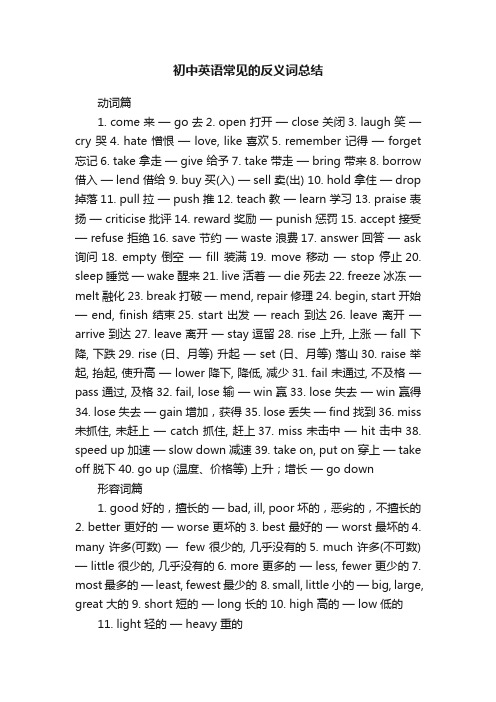
初中英语常见的反义词总结动词篇1. come 来— go 去2. open 打开— close 关闭3. laugh 笑—cry 哭4. hate 憎恨— love, like 喜欢5. remember 记得— forget 忘记6. take 拿走— give 给予7. take 带走— bring 带来8. borrow 借入— lend 借给9. buy 买(入) — sell 卖(出) 10. hold 拿住— drop 掉落11. pull 拉— push 推12. teach 教— learn 学习13. praise 表扬— criticise 批评14. reward 奖励— punish 惩罚15. accept 接受— refuse 拒绝16. save 节约— waste 浪费17. answer 回答— ask 询问18. empty 倒空—fill 装满19. move 移动—stop 停止 20. sleep 睡觉— wake 醒来21. live 活着— die 死去22. freeze 冰冻—melt 融化23. break 打破— mend, repair 修理24. begin, start 开始— end, finish 结束25. start 出发— reach 到达26. leave 离开—arrive 到达 27. leave 离开— stay 逗留28. rise 上升, 上涨— fall 下降, 下跌29. rise (日、月等) 升起— set (日、月等) 落山30. raise 举起, 抬起, 使升高— lower 降下, 降低, 减少31. fail 未通过, 不及格—pass 通过, 及格32. fail, lose 输— win 赢33. lose 失去— win 赢得34. lose 失去— gain 增加,获得35. lose 丢失— find 找到36. miss 未抓住, 未赶上— catch 抓住, 赶上37. miss 未击中— hit 击中 38. speed up 加速— slow down 减速39. take on, put on 穿上— take off 脱下40. go up (温度、价格等) 上升;增长— go down 形容词篇1. good 好的,擅长的— bad, ill, poor 坏的,恶劣的,不擅长的2. better 更好的— worse 更坏的3. best 最好的— worst 最坏的4. many 许多(可数) — few 很少的, 几乎没有的5. much 许多(不可数) — little 很少的, 几乎没有的6. more 更多的— less, fewer 更少的7. most 最多的— least, fewest 最少的8. small, little 小的— big, large, great 大的9. short 短的— long 长的10. high 高的— low 低的11. light 轻的— heavy 重的12. hard 硬的— soft 软的13. thin 薄的— thick 厚的14. wide 宽的— narrow 窄的15. fast, quick 快的— slow 慢的16. smooth 平滑的— rough 粗糙的17. new 新的— old 旧的18. short (个子)矮的— tall (个子)高的19. thin 瘦的— fat 胖的20. young 年轻的— old 年老的21. ill 生病的— healthy, well 健康的22. strong 强壮的— weak 虚弱的23. poor 贫穷的— rich 富裕的24. black 黑的— white 白的25. dark 黑暗的— bright, light 明亮的26. dark 深色的— light 浅色的27. dark (皮肤, 头发等) 黑色的, 深色的— fair (肤色) 白皙的, (头发) 浅色的28. beautiful 美丽的— ugly 丑陋29. straight 直的— curly 卷曲的30. smart, clever 聪明的— silly, foolish, stupid 愚蠢的31. glad, happy 愉快的— sad, sorry, unhappy 难过的32. fun, interesting 有趣的— boring 无聊的33. full 饱的— hungry 饿的34. easy 容易的— difficult, hard 困难的35. easy 舒适的— hard 艰苦的36. free 空闲的— busy 忙碌的37. clean 干净的— dirty 肮脏的38. neat, tidy 整齐的— messy, untidy 凌乱的39. cheap 便宜的— expensive, dear 昂贵的40. quiet 安静的— noisy 吵闹的41. dead 死的— alive, living 活的42. first 最初的— last 最后的43. private 私人的— public 公共的44. rare 罕见的— common 普遍的45. right 正确的— wrong 错误的46. same 相同的— different 不同的47. similar 相似的— different 不同的48. empty 空的— full 满的49. true 真的— false 假的50. safe 安全的— dangerous, unsafe 危险的51. absent 缺席的— present 出席的52. ancient 古老的— modern 现代的53. asleep 睡着的— awake 醒着的54. early 早的— late 迟的55. open 打开的— closed 关闭的56. far 远的— near 近的57. front 前面的— back 后面的58. forward 向前的— backward 向后的59. right 右边的— left 左边的60. indoor 室内的— outdoor 室外的61. cloudy 天阴的— bright, clear, sunny, fine 晴朗的62. rainy 下雨的— dry 干旱的63. dry 干燥的— wet 潮湿的64. cold 寒冷的— hot 炎热的65. cool 凉爽的— warm 温暖的66. negative 消极的— positive 积极的67. cruel 残忍的— kind 善良的68. male 男性的— female 女性的69. foreign 外国的— home 本国的70. senior 高年级的, 年长的— junior 低年级的, 较年小的名词篇1. beginning, start 开端, 开始— end 末端, 结束2. opening 开幕, 开端—ending 结尾, 结局3. success 成功—failure 失败4. winner 胜者— loser 败者5. truth 真相— lie 谎言6. question 问题— answer 答案7. death 死亡— life, birth 生命,出生8. day 白天—night 夜晚9. pleasure 快乐—pain 痛苦10. danger 危险—safety 安全11. entrance 入口— exit 出口12. holiday 假日— weekday 工作日13. town 城镇— country 乡下14. peace 和平— war 战争15. buyer 买家—seller 卖家16. advantage 优点, 有利条件—disadvantage 缺点, 不利条件17. whole 全体, 全部— part 部分18. left 左— right 右19. back 后面, 背部— front 前面, 前部20. top 顶端— bottom 底端其他篇1. from 从—to 到2. now 现在—then 当时3. with 有—without 没有4. both 两者都— neither 两者都不5. all 全部— none 全无6. nobody 无一人— everybody 每个人7. nothing 什么也没有— everything 一切8. always 总是— sometimes 有时9. ever 曾经— never 从未10. certainly 当然地— perhaps, maybe 或许, 大概11. in 在里面— out 在外面 12. inside 在里面— outside 在外面 13. over 在...上— under 在...下14. above 在...上方— below 在...下方15. upstairs 在楼上— downstairs 在楼下16. ahead 在前, 向前— behind 在后, 向后17. forward 向前— back, backward 向后18. here 在这里— there 在那里19. alone 单独地— together 一起地20. badly 恶劣地— well 很好地词组篇1. at first 首先— at last 最后2. at / in the beginning 开始—in the end 最后3. in the daytime 在白天— at night 在夜晚4. in public 当众— in private 私下5. by mistake, by accident 无意地—on purpose 故意的6. be good at 擅长—be weak in 不擅长7. catch up with 赶上—fall behind 落后8. wake up 醒来—fall asleep 睡着9. turn on 打开 (水、煤气、电灯等) — turn off 关上 (水、煤气、电灯等)10. turn up 开大 (声音等) — turn down 关小;调低(音量等)。
英语形容词反义词变化规律

英语形容词反义词变化规律
本文将对英语形容词反义词的变化规律进行详细介绍。
在英语中,很多形容词都有其相应的反义词,这些反义词的构成方式各不相同,有些是通过加前缀或后缀的方式得到的,有些则需要进行完全不同的拼写。
一般而言,英语形容词的反义词构成方式如下:
1. 加前缀
英语中有很多相反的前缀,例如:un-, in-, dis-, im-, il-, ir-等。
通过在形容词前面加上这些前缀,就可以得到其相应的反义词。
例如:
happy - unhappy
possible - impossible
mature - immature
2. 加后缀
有些形容词的反义词则是通过在其后面加上后缀来获得的,这些后缀通常是-less, -ful, -able, -ous, -ish等。
例如:
careful - careless
hopeful - hopeless
comfortable - uncomfortable
3. 完全不同的拼写
还有一些形容词的反义词则需要完全不同的拼写,例如:
good - bad
hot - cold
strong - weak
总之,英语形容词的反义词构成方式各不相同,需要我们通过大量的阅读和积累才能掌握。
希望本文可以帮助读者更好地理解和记忆英语形容词反义词的变化规律。
- 1、下载文档前请自行甄别文档内容的完整性,平台不提供额外的编辑、内容补充、找答案等附加服务。
- 2、"仅部分预览"的文档,不可在线预览部分如存在完整性等问题,可反馈申请退款(可完整预览的文档不适用该条件!)。
- 3、如文档侵犯您的权益,请联系客服反馈,我们会尽快为您处理(人工客服工作时间:9:00-18:30)。
初中阶段加前后缀构成反义词归纳1. un-
able- unable
comfortable-uncomfortable
fair- unfair
friendly- unfriendly
grateful- ungrateful(不领情的)
happy- unhappy
healthy- unhealthy
helpful- unhelpful(无帮助的)
important- unimportant
kind- unkind
known- unknown
lucky- unlucky
necessary- unnecessary
pleasant- unpleasant
popular- unpopular
tidy- untidy
usual- unusual
welcome- unwelcome
2. –less
careful-careless
helpful-helpless(无助的,需要帮助的) useful- useless
harmful- harmless
hopeful-hopeless
meaningful- meaningless
end- endless
3. dis-
honest- dishonest
agree- disagree
like- dislike
appear- disappear
advantage- disadvantage
4. in-
correct- incorrect
active- inactive
5.im-
possible- impossible
polite- impolite
patient- impatient
6.ir-
regular- irregular
一类:加前缀-un
例词:unhappy unusual ungrateful unhelpful
unkind
第二类:加后缀-less
例词:careless homeless hopeless
第三类:加前缀-im
例词:impolite(不礼貌的) impatient(不耐心的)
impossible(不可能的)
第四类:加前缀-in
例词:incorrect(不正确的)inactive(不活跃的)
第五类:加前缀-dis
例词:dishonest(不诚实的)
第六类:加前缀-ir
例词:irregular(不规则的)
归纳:初中阶段绝大多数形容词都是加前缀-un构成其否定形式,记忆起来工程浩大,比较困难。
但如果我们把不是加-un前缀而是加-im, -in, -dis, -ir等前缀的这七个单词牢记的话,那么
就能达到事半功倍的效果。
